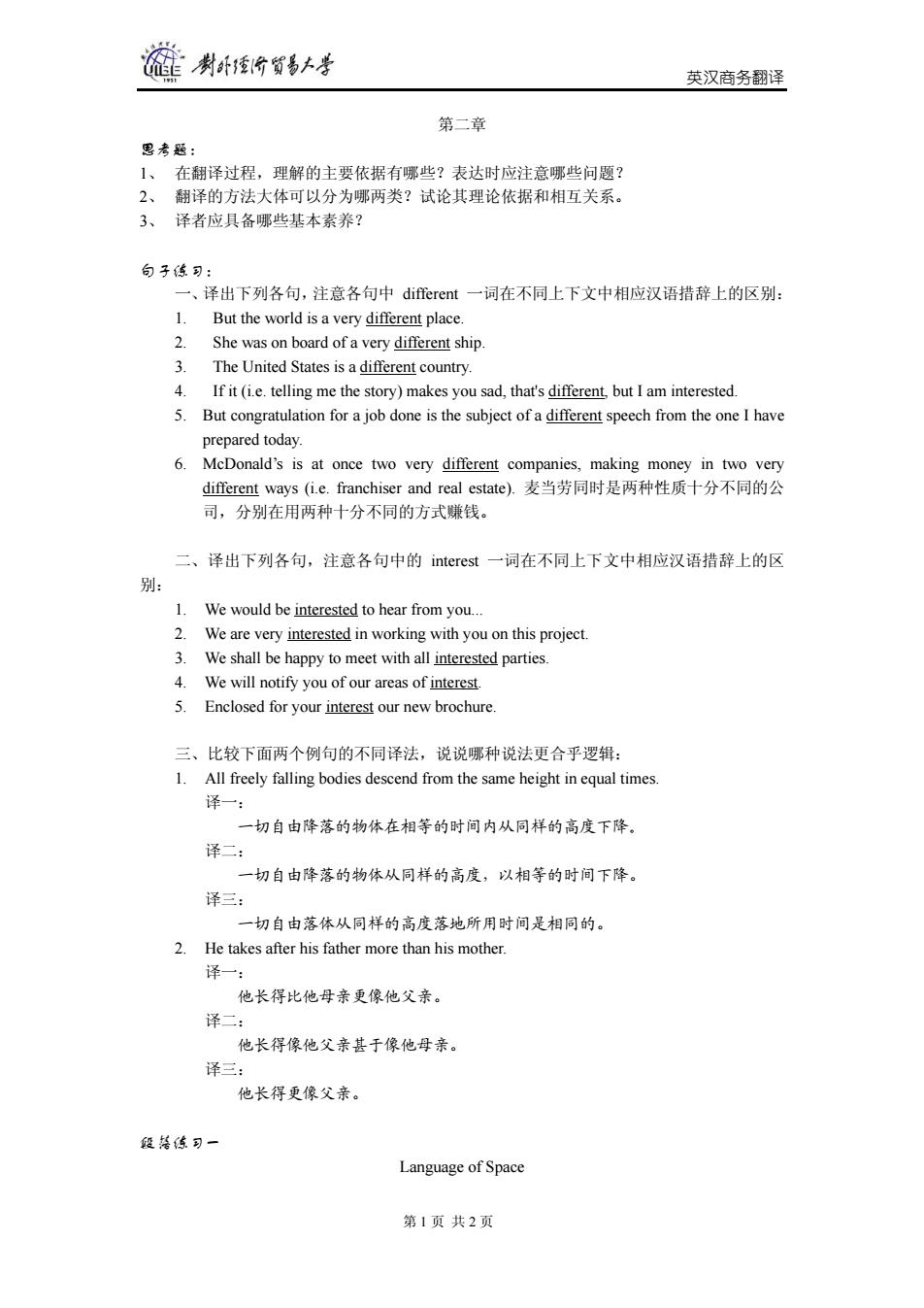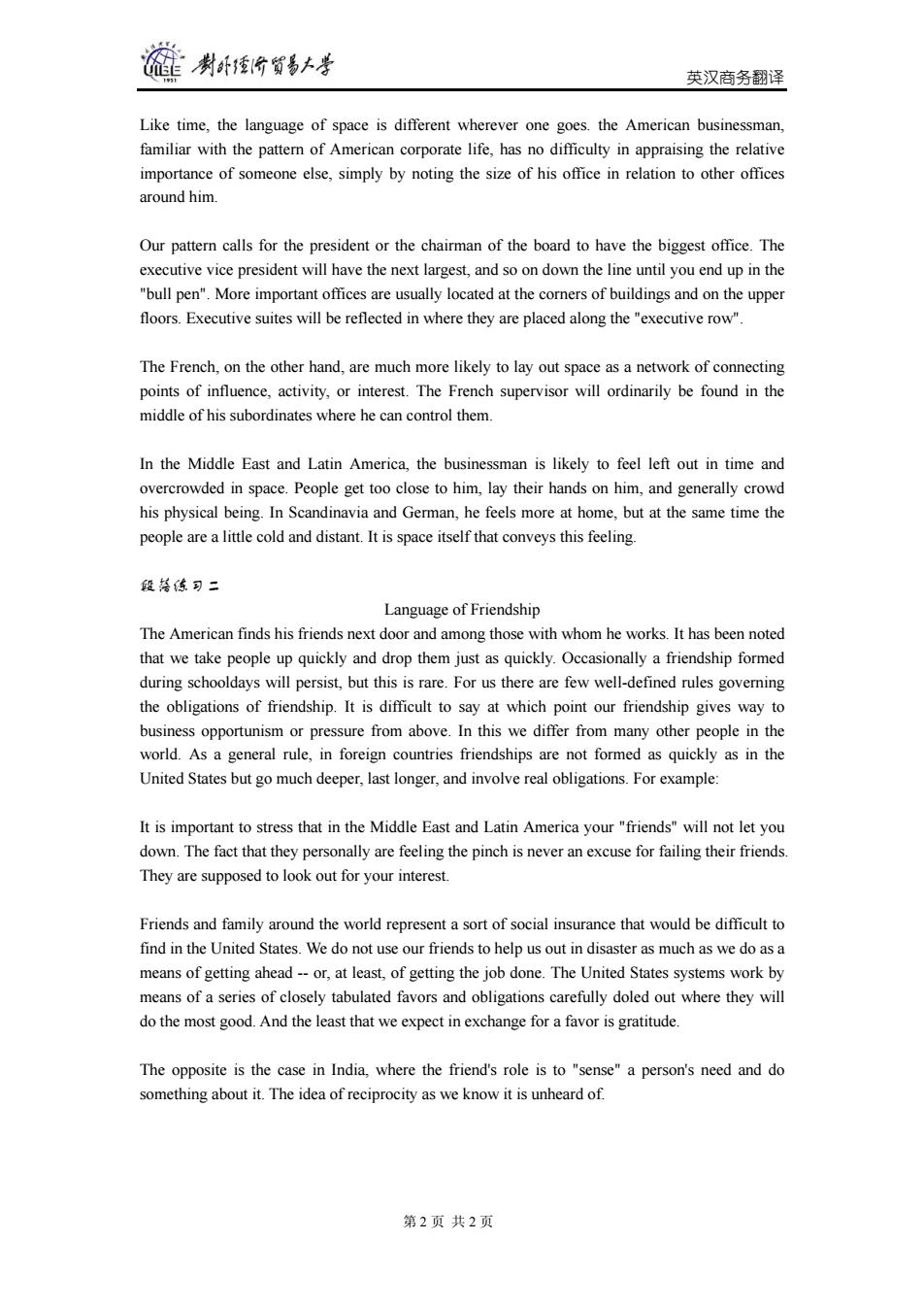
莲 制卧所贸多+考 英汉商务翻译 第二章 思考题: 1、在翻译过程,理解的主要依据有哪些?表达时应注意哪些问题? 2、翻译的方法大体可以分为哪两类?试论其理论依据和相互关系。 3、译者应具备哪些基本素养? 句子缘习: 一、译出下列各句,注意各句中different一词在不同上下文中相应汉语措辞上的区别: 1.But the world is a very different place. 2. She was on board of a very different ship. The United States is a different country 4. If it(ie.telling me the story)makes you sad,that's different,but I am interested 5.But congratulation for a job done is the subject of a different speech from the one I have prepared today. 6. McDonald's is at once two very different companies,making money in two very different ways(i.e.franchiser and real estate)).麦当劳同时是两种性质十分不同的公 司,分别在用两种十分不同的方式赚钱。 二、译出下列各句,注意各句中的interest一词在不同上下文中相应汉语措辞上的区 别: 1.We would be interested to hear from you... 2.We are very interested in working with you on this project. 3.We shall be happy to meet with all interested parties. 4.We will notify you of our areas of interest. 5.Enclosed for your interest our new brochure 三、比较下面两个例句的不同译法,说说哪种说法更合乎逻辑: 1.All freely falling bodies descend from the same height in equal times. 译一: 一切自由降落的物体在相等的时间内从同样的高度下降。 译二: 一切自由降落的物体从同样的高度,以相等的时间下降。 译三: 一切自由落体从同样的高度落地所用时间是相同的。 2.He takes after his father more than his mother. 译一: 他长得比他母亲更像他父亲。 译二: 他长得像他父亲甚于像他母亲。 译三: 他长得更像父亲。 段塔练习一 Language of Space 第1页共2页
英汉商务翻译 第二章 思考题: 1、 在翻译过程,理解的主要依据有哪些?表达时应注意哪些问题? 2、 翻译的方法大体可以分为哪两类?试论其理论依据和相互关系。 3、 译者应具备哪些基本素养? 句子练习: 一、译出下列各句,注意各句中 different 一词在不同上下文中相应汉语措辞上的区别: 1. But the world is a very different place. 2. She was on board of a very different ship. 3. The United States is a different country. 4. If it (i.e. telling me the story) makes you sad, that's different, but I am interested. 5. But congratulation for a job done is the subject of a different speech from the one I have prepared today. 6. McDonald’s is at once two very different companies, making money in two very different ways (i.e. franchiser and real estate). 麦当劳同时是两种性质十分不同的公 司,分别在用两种十分不同的方式赚钱。 二、译出下列各句,注意各句中的 interest 一词在不同上下文中相应汉语措辞上的区 别: 1. We would be interested to hear from you... 2. We are very interested in working with you on this project. 3. We shall be happy to meet with all interested parties. 4. We will notify you of our areas of interest. 5. Enclosed for your interest our new brochure. 三、比较下面两个例句的不同译法,说说哪种说法更合乎逻辑: 1. All freely falling bodies descend from the same height in equal times. 译一: 一切自由降落的物体在相等的时间内从同样的高度下降。 译二: 一切自由降落的物体从同样的高度,以相等的时间下降。 译三: 一切自由落体从同样的高度落地所用时间是相同的。 2. He takes after his father more than his mother. 译一: 他长得比他母亲更像他父亲。 译二: 他长得像他父亲甚于像他母亲。 译三: 他长得更像父亲。 段落练习一 Language of Space 第 1 页 共 2 页

制卧台贸易上兰 英汉商务翻译 Like time,the language of space is different wherever one goes.the American businessman, familiar with the pattern of American corporate life,has no difficulty in appraising the relative importance of someone else,simply by noting the size of his office in relation to other offices around him. Our pattern calls for the president or the chairman of the board to have the biggest office.The executive vice president will have the next largest,and so on down the line until you end up in the "bull pen".More important offices are usually located at the corners of buildings and on the upper floors.Executive suites will be reflected in where they are placed along the "executive row". The French,on the other hand,are much more likely to lay out space as a network of connecting points of influence,activity,or interest.The French supervisor will ordinarily be found in the middle of his subordinates where he can control them. In the Middle East and Latin America,the businessman is likely to feel left out in time and overcrowded in space.People get too close to him,lay their hands on him,and generally crowd his physical being.In Scandinavia and German,he feels more at home,but at the same time the people are a little cold and distant.It is space itself that conveys this feeling. 段荟练习二 Language of Friendship The American finds his friends next door and among those with whom he works.It has been noted that we take people up quickly and drop them just as quickly.Occasionally a friendship formed during schooldays will persist,but this is rare.For us there are few well-defined rules governing the obligations of friendship.It is difficult to say at which point our friendship gives way to business opportunism or pressure from above.In this we differ from many other people in the world.As a general rule,in foreign countries friendships are not formed as quickly as in the United States but go much deeper,last longer,and involve real obligations.For example: It is important to stress that in the Middle East and Latin America your"friends"will not let you down.The fact that they personally are feeling the pinch is never an excuse for failing their friends. They are supposed to look out for your interest. Friends and family around the world represent a sort of social insurance that would be difficult to find in the United States.We do not use our friends to help us out in disaster as much as we do as a means of getting ahead--or,at least,of getting the job done.The United States systems work by means of a series of closely tabulated favors and obligations carefully doled out where they will do the most good.And the least that we expect in exchange for a favor is gratitude. The opposite is the case in India,where the friend's role is to "sense"a person's need and do something about it.The idea of reciprocity as we know it is unheard of. 第2页共2页
英汉商务翻译 Like time, the language of space is different wherever one goes. the American businessman, familiar with the pattern of American corporate life, has no difficulty in appraising the relative importance of someone else, simply by noting the size of his office in relation to other offices around him. Our pattern calls for the president or the chairman of the board to have the biggest office. The executive vice president will have the next largest, and so on down the line until you end up in the "bull pen". More important offices are usually located at the corners of buildings and on the upper floors. Executive suites will be reflected in where they are placed along the "executive row". The French, on the other hand, are much more likely to lay out space as a network of connecting points of influence, activity, or interest. The French supervisor will ordinarily be found in the middle of his subordinates where he can control them. In the Middle East and Latin America, the businessman is likely to feel left out in time and overcrowded in space. People get too close to him, lay their hands on him, and generally crowd his physical being. In Scandinavia and German, he feels more at home, but at the same time the people are a little cold and distant. It is space itself that conveys this feeling. 段落练习二 Language of Friendship The American finds his friends next door and among those with whom he works. It has been noted that we take people up quickly and drop them just as quickly. Occasionally a friendship formed during schooldays will persist, but this is rare. For us there are few well-defined rules governing the obligations of friendship. It is difficult to say at which point our friendship gives way to business opportunism or pressure from above. In this we differ from many other people in the world. As a general rule, in foreign countries friendships are not formed as quickly as in the United States but go much deeper, last longer, and involve real obligations. For example: It is important to stress that in the Middle East and Latin America your "friends" will not let you down. The fact that they personally are feeling the pinch is never an excuse for failing their friends. They are supposed to look out for your interest. Friends and family around the world represent a sort of social insurance that would be difficult to find in the United States. We do not use our friends to help us out in disaster as much as we do as a means of getting ahead -- or, at least, of getting the job done. The United States systems work by means of a series of closely tabulated favors and obligations carefully doled out where they will do the most good. And the least that we expect in exchange for a favor is gratitude. The opposite is the case in India, where the friend's role is to "sense" a person's need and do something about it. The idea of reciprocity as we know it is unheard of. 第 2 页 共 2 页